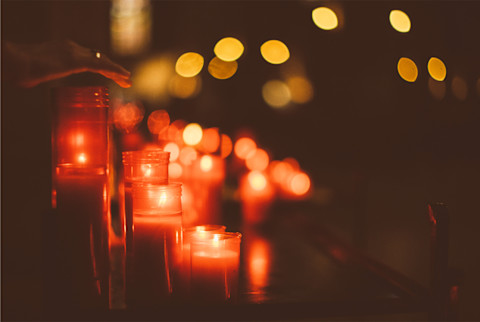
As reluctant as we may be to receive it, there is a gift that comes when we become familiar with impermanence. It heightens our experience of the preciousness of this moment.
For the last 10 years, I have been fortunate enough to be guided into the ephemeral space of the Día de los Muertos by women in the Mexica tradition who have shared their rituals and ceremonies and encouraged me to honor my ancestors in this way.
Their generosity in taking me into a space that is often considered taboo by mainstream culture has enriched my life in magical ways beyond what I can fully explain. But today, in honor of this special occasion, I'll try to put words to some of the lessons they've taught me about life, death, and celebration.
The ceremony and celebration of Día de los Muertos.
Each year, Cristina Cabrera, my daughter's longtime schoolteacher, created a communal altar at school where the children would add pictures of people they had lost, along with little objects that those people liked: a piece of chocolate for a late great-grandfather, a ball of wool for a departed aunt.
Then children, parents, teachers, and staff would gather to share stories to keep our loved ones alive in this ancestral way. It seemed so light and easy for the little ones to glide between worlds as if it were just another one of their playful activities of the day.
Last year, one of the first small gatherings I attended was with Perla Yasmeen Meléndez, who guided my daughter and me in creating collages with photos of our dead and images we thought they would like. As we went through magazines, scissors and glue in hand, I was moved by the natural way in which I was becoming the link in this lineage. I was fulfilling my role of joining ancestors with their descendants. When the collages were done, we wrapped our creations around the tall glass of the "velones" candles and used them as colorful additions to our altar.
This year, Felicia Cocotzin Ruiz, author of Earth Medicine, whom I learned about from Padma Lakshmi's Taste the Nation, led an online gathering focused on creating an altar for ancestors. In this class, she taught us how to bring each element into the ceremony in a way that ushered the departed back to us.
She referred to our altars as portals to guide them home and by the end, they also felt like a portal of reassurance for each of us. Each one contained a candle to light the way, water to quench thirst on the long journey, aromatic copal to create a path of scent.
As a nature practice teacher, I have enjoyed integrating these Día de los Muertos rituals into my personal nature celebrations over the years. Here are three words and reflections that have struck me along that way—each one continuing to enrich my life long after the holiday has passed.
Joy:
Yes, of course there is sadness and longing for our departed loved ones, but the main flavor of the Día de los Muertos celebration is joy. The emphasis is on acknowledging the goodness of your ancestors and how they enriched your life.
The practice is void of judgment, and this key omission silently and poignantly recognizes the missteps that all of us take on our own paths toward growth. The holiday reminds us to recognize someone's humanity beyond their mistakes. In practicing this way of seeing, you are also supported in your own evolution.
Remembering:
This word keeps coming up in everything related to nature practice and our process of deepening our relationship with nature.
When you remember your ancestors and how they supported your love of nature, you remember a part of yourself that makes you feel more whole, more complete, more centered. You are able to ground in the sense that you are not floating in space on your own. Rather, you are a part of an expansive constellation of love that is always flowing through you.
Senses:
In many ways, we have lost respect for our senses. By spending such exaggerated amounts of time indoors, we have reduced them to barely functional. But Indigenous wisdom insists on the importance of not only awakening our senses but on constantly refining each one.
This doesn't just apply to your physical senses but the subtler ones too. This is because your senses are your primary link to nature and to all that is sacred.
The altar of the Día de los Muertos emphasizes this by creating a multisensory experience from the scent of the marigold to the warmth of the candles to the spiritual awareness that comes when you create a space that supports you as you drop into the sacred.
The bottom line.
Whether you build a formal altar, dust off the picture of a loved one, or share a story of someone you have lost, may you somehow invite your ancestors back on this Día de los Muertos. In my experience, doing so is a way to experience gliding between worlds—and that's nothing if not magical.
